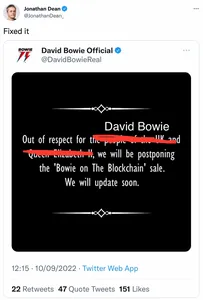Well, despite being pretty bullheaded about their stance on NFTs and web3, even Ubisoft is now backing away from it all. In April, only a few months after launch, Ubisoft announced that there would be no more NFTs for the Ghost Recon Breakpoint title. Now, the CEO is putting a different spin on the company's once determination to introduce NFTs: "we are still in research mode" when it comes to web3 technologies, he said. "We probably were not good at saying we are researching. We should have said we were working on it, and when we have something that gives you a real benefit, we'll bring it to you." I imagine that might come as a shock to the handful of people who actually bought the Ghost Recon Breakpoint NFTs, given they were promised "real benefit" back in December and are now left with useless collectibles.
Ubisoft now claims its forceful introduction of NFTs was only "research"
Algorand Foundation discloses $35 million exposure to Hodlnaut
The Algorand Foundation reassured people that the funds potentially lost to Hodlnaut were less than 3% of the Foundation's assets, and "we do not anticipate operational or liquidity issues due to this action". They also wrote that they would be "pursuing all legal remedies to maximize asset recovery".
- "Algorand Foundation exposure to Hodlnaut", Algorand Foundation
New Free DAO loses $1.25 million in flash loan attack
Shiba Inu developers leak AWS credentials on Github
On September 8, a security researcher published a blog post reporting that the developers behind the Shiba Inu coin — one with reality-defying levels of popularity at #13 on the list of coins by market cap — had apparently published their AWS credentials to Github. After making the discovery, his team attempted to contact the developers, but were not able to find a bug bounty program, responsible disclosure policy, or even people they could reach out to personally.
Luckily for Shiba Inu (and somewhat miraculously), the tokens were invalidated two days later before anyone malicious apparently took advantage of the vulnerability. The researcher wrote that the exposure had "the potential to cause serious security breaches, including but not limited to user fund theft, token embezzlement, disruption of services, etc."
Coinbase funds lawsuit against the Treasury Department over Tornado Cash sanctions
In the suit, they argue that the Treasury Department overstepped its authority in what it can sanction, claiming that "Tornado Cash software, including the smart contracts, consists of immutable open-source software code, which is not property, a foreign country or a national thereof, or a person of any kind." They've also argued that the designation is unconstitutional under both the free speech protections of the First Amendment and the due process protections of the Fifth Amendment.
Crypto reacts to Queen Elizabeth's death
Is there a way to include in one's will that you don't wish to be turned into an NFT or commemorated with a "Queen Inu" token when you die? Asking for a friend.
Company begins selling Celsius-themed Monopoly game... three months after Celsius suspends withdrawals
If you were wondering who might decide to sell such a product, well, USA Strong's founder and CEO is none other than Krissy Mashinsky, wife of Celsius founder Alex Mashinsky.
Both the announcement tweet and the game product page were taken down shortly after the announcement, likely due to the less-than-enthused response from Celsius users.
- Tweet by Stephanie Martin
- Celsiusopoly on USA Strong
Investors face $11 million loss in VBit Technologies/Advanced Mining Group, an alleged crypto Ponzi scheme
However, customers trying to withdraw their "rewards" saw increasing delays in receiving their payouts — days, then weeks, then an indefinite pause. A COO hired by the group left the company only three weeks later. On June 27, the group sent an email to its customers explaining that there was a "potential pending settlement" with the SEC — the first customers heard of the existence of any investigation — and that they would no longer serve customers in the U.S. On July 15, the company promised to refund customers what they paid to sign up with the program, but no refunds or further updates have materialized.
The company has faced lawsuits in Washington state and Delaware, and apparently operated for two years after executives had acknowledged they were violating securities laws. The Delaware lawsuit describes the operation as a Ponzi scheme, and alleges that the company sold packages that would have required far more computing power than the company actually had access to.
- "Investors fear millions lost in Pennsylvania’s largest cryptocurrency scandal based in South Philly", The Philadelphia Inquirer
David Bowie NFTs anger fans
A tweet from OpenSea announcing the project received some positive replies, and a lot of other NFT projects trying to promote Bowie-themed NFTs they'd included in their collections. However, the tweet from David Bowie Twitter account seemed to be received almost universally negatively, with many commenters writing that they wished the estate would just raise money for charity without getting into NFTs, and others writing that they didn't think Bowie would have supported NFTs.
On September 10, the account announced that "Out of respect for the people of the UK and Queen Elizabeth II, we will be postponing the 'Bowie on the Blockchain' sale. We will update soon."






